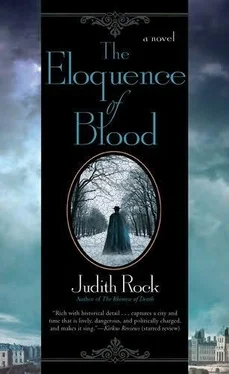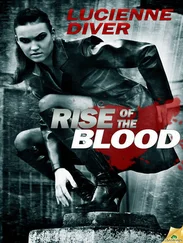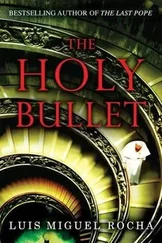Judith Rock - The Eloquence of Blood
Здесь есть возможность читать онлайн «Judith Rock - The Eloquence of Blood» весь текст электронной книги совершенно бесплатно (целиком полную версию без сокращений). В некоторых случаях можно слушать аудио, скачать через торрент в формате fb2 и присутствует краткое содержание. Жанр: Исторический детектив, на английском языке. Описание произведения, (предисловие) а так же отзывы посетителей доступны на портале библиотеки ЛибКат.
- Название:The Eloquence of Blood
- Автор:
- Жанр:
- Год:неизвестен
- ISBN:нет данных
- Рейтинг книги:5 / 5. Голосов: 1
-
Избранное:Добавить в избранное
- Отзывы:
-
Ваша оценка:
- 100
- 1
- 2
- 3
- 4
- 5
The Eloquence of Blood: краткое содержание, описание и аннотация
Предлагаем к чтению аннотацию, описание, краткое содержание или предисловие (зависит от того, что написал сам автор книги «The Eloquence of Blood»). Если вы не нашли необходимую информацию о книге — напишите в комментариях, мы постараемся отыскать её.
The Eloquence of Blood — читать онлайн бесплатно полную книгу (весь текст) целиком
Ниже представлен текст книги, разбитый по страницам. Система сохранения места последней прочитанной страницы, позволяет с удобством читать онлайн бесплатно книгу «The Eloquence of Blood», без необходимости каждый раз заново искать на чём Вы остановились. Поставьте закладку, и сможете в любой момент перейти на страницу, на которой закончили чтение.
Интервал:
Закладка:
“What a superb dove, mon pere!” Damiot’s eyes were shining. He dropped Boeuf’s reins and put out a tentative hand to stroke the bird. “And what a good name for her; that little tuft of feathers on her head looks exactly like a lady’s headdress.”
“Ah, you like doves?” The priest beamed at Damiot as though at a long-lost son. “Come in, come in!”
Damiot followed the priest into the house, leaving Charles to tether the horses loosely to a small tree beside the house, where they could crop the long grass. He went inside and found Damiot holding Fontange and the priest talking steadily about doves as he poured white wine into wooden cups.
“See?” Damiot said, as Charles peered at the bird, “see how perfect her eyes are, and how bright?”
“How do you know so much about doves? I thought you never left Paris.”
“My father has a dovecote.”
The priest turned, holding out two pottery cups. “Does he, mon pere? What sort of doves has he? How many?”
The low-ceilinged, sparsely furnished room was marginally warmer than the outdoors. Charles leaned against the wall to listen to the bird talk, enjoying the wine and this new side of Damiot. And thinking that the parish priest would be more willing to answer their questions after he’d talked awhile. He let twenty minutes or so pass and was about to interrupt, when the church bell began to ring. The parish priest thrust Fontange at Damiot.
“Another Mass to say, but I will return as quickly as I can. Or perhaps you would like to come? And after, you are welcome to share my poor dinner.”
“Mon pere, you are most courteous,” Charles said quickly, before Damiot could accept the invitation. “But we are here on the order of our rector and must be about doing what he has asked us to do.”
The priest’s face fell. “Oh. I see. And what is that?” Regretfully, he took the bird from Damiot, carried her to a window on the other side of the room, and let her fly. “To your cote, ma petite, I will come back to you very soon.”
“We are looking for the man called Paul Saglio, mon pere.”
The priest turned around with a sour expression. “He is at the big house on the right, almost at the end of the village. Anyone will tell you. But I warn you, the man is a rogue. I have tried to warn Madame Theriot, but she will hear nothing bad of him. The idiot woman has made him her cook; he feeds her on Italian messes, and the other servants are saying he plans to poison her.” He brushed uselessly at the bird stains on his cassock. “They say, too, that she will hardly let him out of the house. And that he purrs at her like a cat.” He wandered across the room and opened the door. “You are welcome to my house at any time, mes peres, at any time.” As he went out, he said over his shoulder to Damiot, “I need to rebuild my dovecote. Perhaps you can advise me, mon pere, your esteemed father being such an authority…” They watched him go reluctantly up the lane, still talking.
Charles laughed and put his cup back on the sideboard. “Do you suppose the good man always leaves his guests the run of his house? Did he even tell you his name?”
Damiot shook his head as they went out into the lane. “I wish we could have stayed. That little Fontange is the prettiest dove I have ever seen. My father will be eaten up with envy when he hears about her.”
“I had no idea men felt such passion for doves.”
“I have tried to persuade the school bursar to build a dovecote in the fathers’ garden, but he refuses to spend the money. Especially now.” Damiot sighed. “Nothing is more beautiful in a garden than the cooing of doves.”
They mounted Flamme and Boeuf and ambled along the village street until they came to closed wooden gates with a high expanse of slate roof showing beyond them.
“This looks likely.” Charles swung his leg easily over Flamme’s back and dismounted.
Damiot struggled out of his saddle and they walked the horses to the gate. The manservant who answered the bell was courteous enough and wished them a good year, but his uneasy glances and brief answers made Charles certain that he had heard the anti-Jesuit rumors. Yes, he told them, this was Mme Theriot’s house. No, she was not at home. Yes, Paul Saglio worked here and could be found in the kitchen. He took them through the cobbled court, past a pretty girl drawing water from the well, and opened the rear door. He gestured them inside, called out to Saglio, and left them before anyone answered.
“What do Jesuits want with me?” a voice growled belatedly from the kitchen. “Tell them to go to hell.”
Charles, with Damiot behind him, followed the voice into a large, high-ceilinged kitchen with two large fireplaces, a massive worktable in the center, and every sort of pot, pan, cooking fork, sieve, ladle, spice box, and kitchen cloth overflowing the shelves and cupboards crowded around the walls.
“Hell is a long journey, Monsieur Saglio,” Charles said pleasantly. “Though the warmth might be all too appealing on a day like this.”
The small lithe man with a white cloth tied around his head turned sharply from the oven set into the wall. He held a long flat wooden paddle for putting loaves in the oven. His lip curled and his eyes traveled slowly from their hats to their boots.
“Your Society already has the Mynette goods. So I hear. I am only a poor servant; you’ll get no gold from me, my fine blackbirds.” His face darkened. “How did you find me?”
“Someone knew you were here,” Charles said vaguely, not wanting to set Saglio on the hapless priest. “So you have heard of Mademoiselle Mynette’s murder.”
“Who has not?” He began to softly beat the wooden paddle against his leg.
Charles decided not to waste time on subtlety. With an eye on the paddle, he said, “You tried to dishonor her and she turned you out of the house. Shortly before she was killed.”
Saglio’s black eyes flashed from Charles to Damiot. “What is that to you?”
“You were very angry with her.”
“Fickle bitch.” The Italian flung the paddle onto the work table. “Sweet as sugar and then acted like she was Blessed Mary herself. ‘Ooooh, don’t touch me, Paul Saglio!’ ”
Charles clasped his hands tightly together at his waist to keep himself from hitting the man. “She promised more than she gave?”
Nodding, Saglio widened his eyes and broke into a stream of furious Italian.
“Ah, monsieur,” Damiot said, his voice full of spurious sympathy, “I see, she spurned your manhood. That has moved men to kill more times than can be told.”
Saglio stared at him. “Kill her? Me? Do you think I am crazy? Why would I risk the gallows for the pleasure of strangling the little bitch?”
“Then tell us what you were doing before dawn on the Friday morning after Christmas.”
“Why not? I was running all over the house like every other servant here, trying to get old Madame Theriot on her way to Paris.” He rolled his eyes. “The old ones are worse than the young ones. But they have more money,” he leered, “and money compensates trouble taken.” Grinning at the expressionless faces of the two Jesuits, he slowly adjusted the well-filled front of his breeches. “Trouble of every kind, you understand.”
Wanting to get out of Saglio’s presence even more than he wanted to slam a fist into the man’s face, Charles said curtly, “Who can swear you were here that morning?”
“Alain in the yard, the one who came to the door. The pretty maid who’s been out at the well too long talking to Alain. My mistress herself, though she’s already left on her round of New Year’s visits.”
Charles looked at Damiot. “Mon pere, will you go and speak with the maidservant and Alain?”
Читать дальшеИнтервал:
Закладка:
Похожие книги на «The Eloquence of Blood»
Представляем Вашему вниманию похожие книги на «The Eloquence of Blood» списком для выбора. Мы отобрали схожую по названию и смыслу литературу в надежде предоставить читателям больше вариантов отыскать новые, интересные, ещё непрочитанные произведения.
Обсуждение, отзывы о книге «The Eloquence of Blood» и просто собственные мнения читателей. Оставьте ваши комментарии, напишите, что Вы думаете о произведении, его смысле или главных героях. Укажите что конкретно понравилось, а что нет, и почему Вы так считаете.












